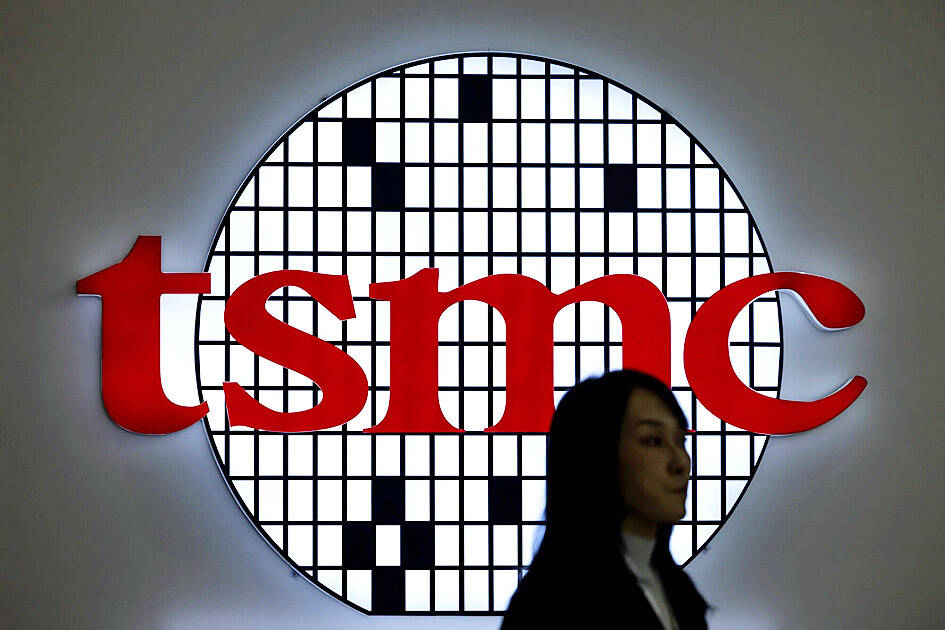Taiwan Semiconductor Manufacturing Co (TSMC, 台積電) yesterday said it had notified the US government that one of its chips was reportedly found in a Huawei Technologies Co (華為) product, in a possible breach of US export restrictions.
International media reports said that Canada-based research firm TechInsights recently discovered an Ascend 910B chip manufactured by TSMC while taking apart Huawei’s highest-end artificial intelligence (AI) accelerators. The Ascend 910B chip is considered the Chinese company’s most advanced AI chip.
TechInsights informed TSMC of its findings before publishing them in a report — which has yet to be released — while TSMC notified the US Department of Commerce, Reuters reported.

Photo: Bloomberg
The US placed Huawei on a trade restriction list in 2019 for national security reasons, meaning the Shenzhen-based company is barred from doing business with TSMC and its contract chipmaking peers without a US government license.
The Taiwanese chipmaker has said it stopped all shipments to Huawei after Sept. 15, 2020, which the company reiterated when asked about the TechInsights report.
“TSMC is a law-abiding company, and we are committed to complying with all applicable rules and regulations, including applicable export controls. In compliance with the regulatory requirements, TSMC has not supplied to Huawei since mid-September 2020,” the company said in a statement yesterday. “We proactively communicated with the US Commerce Department regarding the matter in the report. We are not aware of TSMC being the subject of any investigation at this time.”
Huawei said in a statement it has not “produced any chips via TSMC after the implementation of the amendments made by the US Department of Commerce to its FDPR that target Huawei in 2020,” referring to the foreign direct product rule — a US trade restriction.
“Huawei has never launched the 910B chip,” the company said.
A commerce department spokesperson said that the agency’s Bureau of Industry and Security (BIS), which is responsible for semiconductor trade restrictions, is “aware of reporting alleging potential violations of US export controls.”
“We cannot comment on whether any investigation is ongoing,” the spokesperson said. “BIS is committed to ensuring compliance with the robust controls we have put in place related to China’s acquisition of advanced semiconductors.”
BIS officials met with TSMC executives in the middle of this month about issues relating to the chipmaker’s supply chain, including whether third-party distributors might provide China the ability to access restricted technology, said one of the people, who described the meeting as collaborative.
The meeting did not touch on the TechInsights report, the person said.
It is not clear whether Huawei had designed or placed orders for the 910B chip prior to its blacklisting. The processor was first spotted in server products as early as 2022, Washington-based think tank the Center for Security and Emerging Technology said.
It started gaining exposure in Chinese news outlets last year, although Huawei has not officially hosted a launch event.
IFlytek Co (科大訊飛) unveiled a new server product with the AI accelerator in August last year, and Baidu Inc (百度) ordered more than 1,000 910B units last year, Taipei-based research firm TrendForce Corp (集邦科技) said.

The Central Election Commission has amended election and recall regulations to require elected office candidates to provide proof that they have no Chinese citizenship, a Cabinet report said. The commission on Oct. 29 last year revised the Measures for the Permission of Family-based Residence, Long-term Residence and Settlement of People from the Mainland Area in the Taiwan Area (大陸地區人民在台灣地區依親居留長期居留或定居許可辦法), the Executive Yuan said in a report it submitted to the legislature for review. The revision requires Chinese citizens applying for permanent residency to submit notarial documents showing that they have lost their Chinese household record and have renounced — or have never

A magnitude 5.6 earthquake struck off the coast of Yilan County at 12:37pm today, with clear shaking felt across much of northern Taiwan. There were no immediate reports of damage. The epicenter of the quake was 16.9km east-southeast of Yilan County Hall offshore at a depth of 66.8km, Central Weather Administration (CWA) data showed. The maximum intensity registered at a 4 in Yilan County’s Nanao Township (南澳) on Taiwan’s seven-tier scale. Other parts of Yilan, as well as certain areas of Hualien County, Taipei, New Taipei City, Taoyuan, Hsinchu County, Taichung and Miaoli County, recorded intensities of 3. Residents of Yilan County and Taipei received

Taiwan has secured another breakthrough in fruit exports, with jujubes, dragon fruit and lychees approved for shipment to the EU, the Ministry of Agriculture said yesterday. The Animal and Plant Health Inspection Agency on Thursday received formal notification of the approval from the EU, the ministry said, adding that the decision was expected to expand Taiwanese fruit producers’ access to high-end European markets. Taiwan exported 126 tonnes of lychees last year, valued at US$1.48 million, with Japan accounting for 102 tonnes. Other export destinations included New Zealand, Hong Kong, the US and Australia, ministry data showed. Jujube exports totaled 103 tonnes, valued at

BIG SPENDERS: Foreign investors bought the most Taiwan equities since 2005, signaling confidence that an AI boom would continue to benefit chipmakers Taiwan Semiconductor Manufacturing Co’s (TSMC, 台積電) market capitalization swelled to US$2 trillion for the first time following a 4.25 percent rally in its American depositary receipts (ADR) overnight, putting the world’s biggest contract chipmaker sixth on the list of the world’s biggest companies by market capitalization, just behind Amazon.com Inc. The site CompaniesMarketcap.com ranked TSMC ahead of Saudi Aramco and Meta Platforms Inc. The Taiwanese company’s ADRs on Tuesday surged to US$385.75 on the New York Stock Exchange, as strong demand for artificial intelligence (AI) applications led to chip supply constraints and boost revenue growth to record-breaking levels. Each TSMC ADR represents